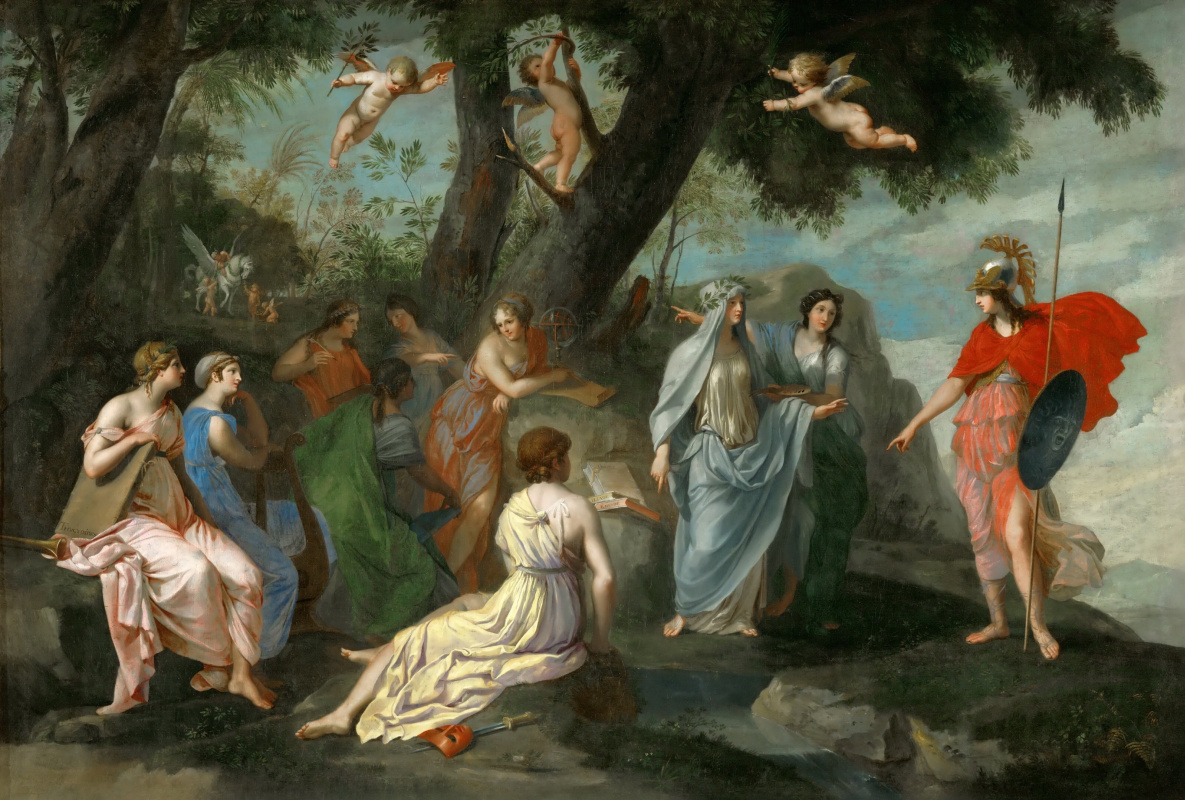log in
Enter site
Login to use Arthive functionality to the maximum
Minerva and the muses
Jacques de Stella • Painting, 1450, 116×162 cm
Description of the artwork «Minerva and the muses»
Minerva (lat. Minerva, ETR. Menrva — presumably from the Italian Meneswā "Measure"), corresponding to the Greek Pallas Athena: in Roman mythology the goddess of wisdom. Especially revered her the Etruscans (under the name Menrva) as lightning to the goddess of mountains and useful discoveries and inventions. And in Rome in ancient times, Minerva was considered the goddess of mollienesia and warlike, as indicated by the gladiatorial games, not necessarily held during the main holiday in her honor — Quinquatria (Quinquatrus).
Of direct relevance to Minerva as the patroness of the military is confirmed in groprinosin and dedications that were made by the Roman generals in her honor after some brilliant victory. Thus, Lucius Aemilius Paul, after the conquest of Macedonia, burned part of the production, in honour of Minerva; Pompey after his triumph he built her in the campus Martius the temple; so did Augustus after the victory of Actium. But, mainly, the Roman Minerva is revered as the patroness and partly the inventor of crafts and arts. It protects Sherstobitov, shoemakers, doctors, teachers, sculptors, poets and, especially, musicians; it edifies, teaches women and manages them in all their works.
Important celebration in her honor — Quinquatrus or Quinquatria, held from 19 to 24 March, was the feast of artisans and artists as well as students, who at the time of the festivities were exempted from classes and then brought their teachers a fee for the teaching — minerval.
Minerva sometimes mistakenly identified with the goddess of wisdom Be character of Lithuanian mythology.
In honor of Minerva named the asteroid (93) Minerva, opened in 1867.
In France, from 1838, a single brand for all products of silver was the profile picture of Minerva.
Of direct relevance to Minerva as the patroness of the military is confirmed in groprinosin and dedications that were made by the Roman generals in her honor after some brilliant victory. Thus, Lucius Aemilius Paul, after the conquest of Macedonia, burned part of the production, in honour of Minerva; Pompey after his triumph he built her in the campus Martius the temple; so did Augustus after the victory of Actium. But, mainly, the Roman Minerva is revered as the patroness and partly the inventor of crafts and arts. It protects Sherstobitov, shoemakers, doctors, teachers, sculptors, poets and, especially, musicians; it edifies, teaches women and manages them in all their works.
Important celebration in her honor — Quinquatrus or Quinquatria, held from 19 to 24 March, was the feast of artisans and artists as well as students, who at the time of the festivities were exempted from classes and then brought their teachers a fee for the teaching — minerval.
Minerva sometimes mistakenly identified with the goddess of wisdom Be character of Lithuanian mythology.
In honor of Minerva named the asteroid (93) Minerva, opened in 1867.
In France, from 1838, a single brand for all products of silver was the profile picture of Minerva.


